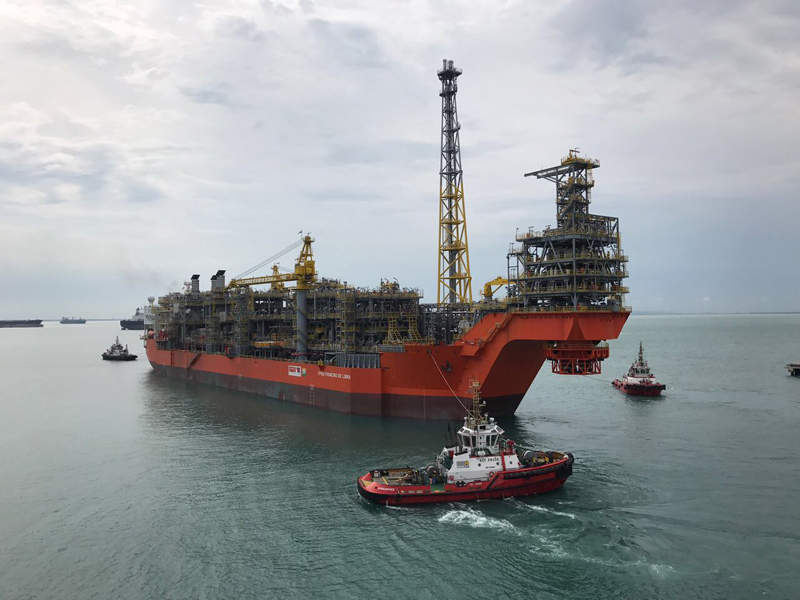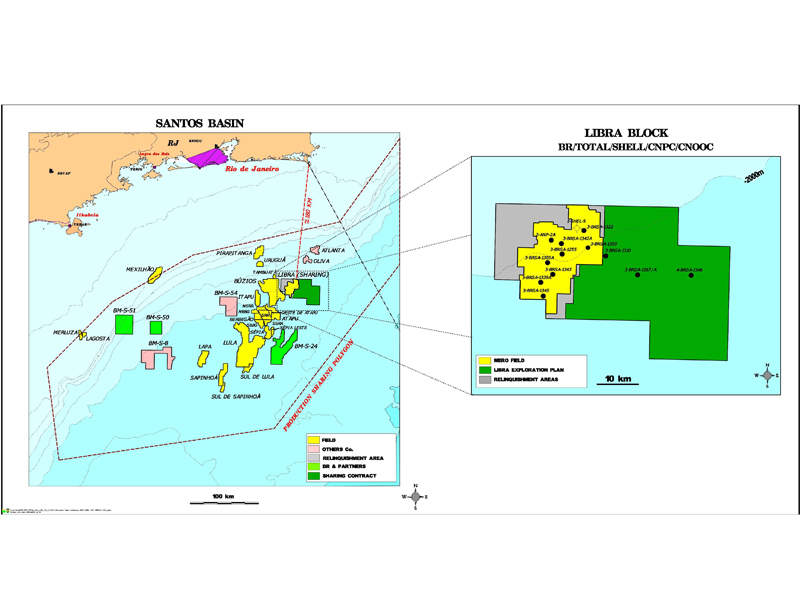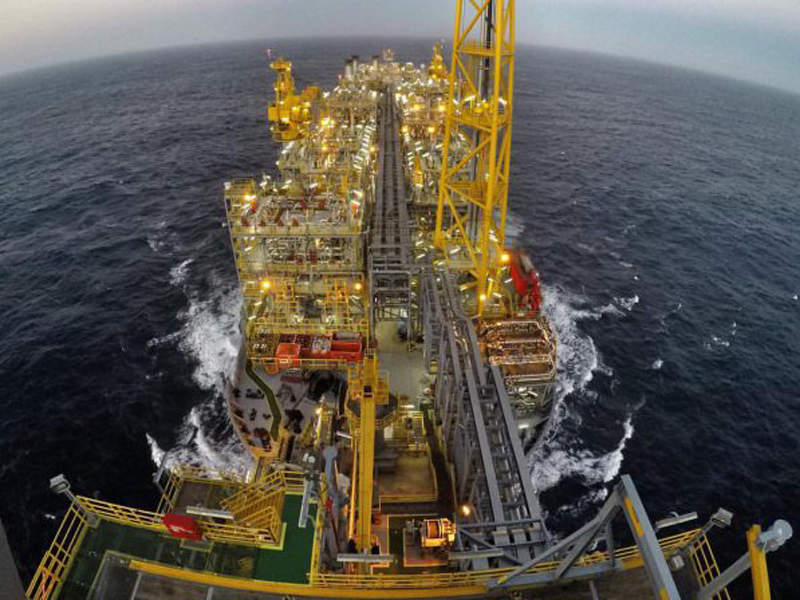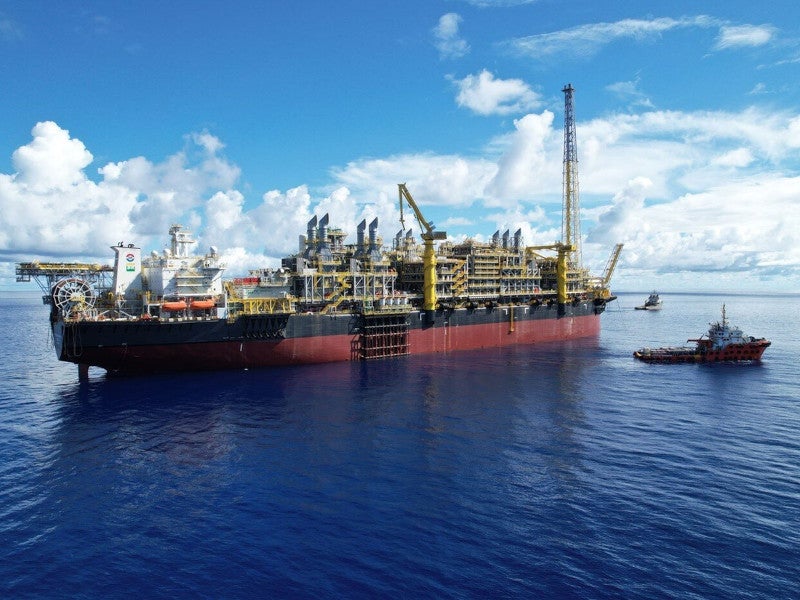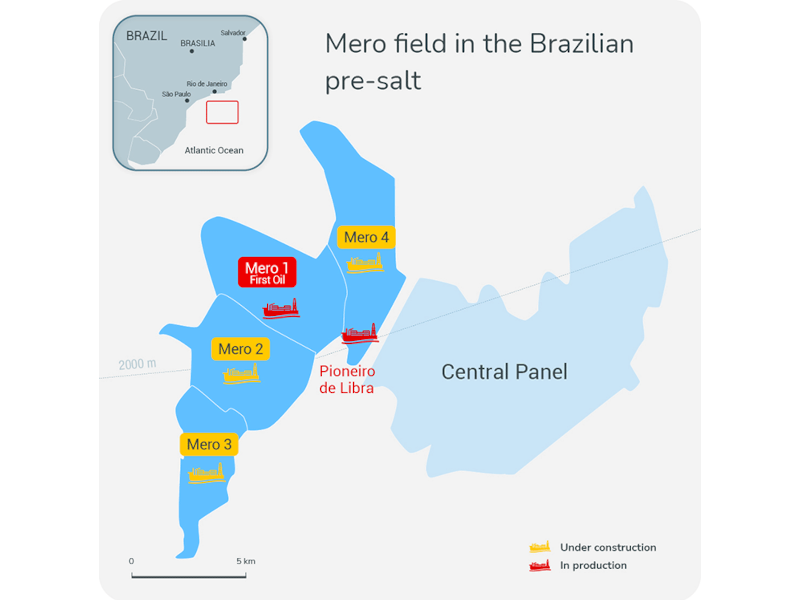The Mero field is an ultra-deepwater oil field situated approximately 180km offshore Rio de Janeiro, Brazil, in the Libra block. It is located in the pre-salt area of the Santos Basin.
The field is owned by the Libra consortium, which is led by Petrobras (38.6%) and includes Shell (19.3%), TotalEnergies EP Brasil (19.3%), CNODC (9.65%), CNOOC (9.65%) and Pré-sal Petróleo – PPSA (3.5%).
Petrobras declared the commercial viability of the Mero oil field in November 2017. First oil was achieved from the field in April 2022.
Mero oil field discovery and reserves
The Mero oil field was discovered by the 2-ANP-2A-RJS appraisal well, which was drilled in 2010.
The drilling was conducted in the north-western part of the giant Libra block, as part of the Libra oil field appraisal.
A total of 12 appraisal wells were drilled to determine the commercial viability of the field. The wells discovered oil columns as thick as 410m.
An extended well testing (EWT) programme was carried out within the Mero 2 and Mero 3 areas using the Pioneiro de Libra floating production storage and offloading (FPSO) unit.
The Mero oil field holds approximately 3.3 billion barrels of oil equivalent (boe) in high-quality, high-yield carbonate reservoirs.
Mero oil field development details
The Brazilian oil field is divided into four areas, namely Mero 1, Mero 2, Mero 3 and Mero 4, which are all being developed separately.
As the project is being developed in four phases, it involves the development of four FPSO units to produce and process the oil extracted from the wells in each respective area.
Each FPSO has an operational capacity of 180,000 boe a day (boed) as well as 12 million cubic metres a day (Mcmd) of gas.
The project will implement Petrobras’ high-pressure separation technology, known as HISEP. The unique technology aims to segregate carbon dioxide (CO₂)-rich gas from oil for reinjection into the seabed, which will reduce the amount of gas entering the FPSOs while enhancing oil production as well as the field’s efficiency.
Details of Mero-1 FPSO
The Mero-1 project, which is the first definitive production system of the field, covers the development of 17 interconnected wells. Six producing wells and seven injectors will initially be linked to the FPSO. Peak production is anticipated by the end of 2022.
Named Guanabara MV31, the FPSO is operated by MODEC. It has a water injection capacity of 225,000 barrels a day and storage capacity of 1.4 million barrels of crude oil. Deployed at a water depth of 1,930m, roughly 150km off the coast of Rio de Janeiro, the unit features a spread mooring system.
The FPSO is integrated with a gas reinjection system to maintain pressure and enhance oil recovery. Mero-1 is also part of a carbon capture, utilisation and storage (CCUS) project.
Mero-2 FPSO details
The final investment decision (FID) for the development of the second phase of the Mero project (Mero-2 project) was announced in June 2019. The Mero-2 project is scheduled to start operations through the FPSO Sepetiba in 2023.
The FPSO Sepetiba has a water injection capacity of 250,000 barrels a day and storage capacity of 1.4 million barrels of crude oil. It will be moored at a water depth of 2,000m.
It is owned by SBM Offshore (SBM, 64.5%), Mitsubishi (20%) and Nippon Yusen Kabushiki Kaisha (15.5%).
Mero-3 FPSO details
Production from the third phase of the Mero development (Mero-3 project) is expected to start through the FPSO Marechal Duque de Caxias in 2024.
The production unit will be located at a water depth of 2,200m in the southern part of the Mero oil field, about 200km off the coast.
The development plan includes linking the FPSO with 15 wells, including eight oil producers and seven water and gas injectors. The wells will be connected using subsea infrastructure consisting of fixed production and injection ducts, control umbilicals, and flexible service ducts.
The Mero-3 project area will be the platform for a pilot programme to test HISEP.
Mero-4 FPSO details
The fourth definitive production unit, FPSO Alexandre de Gusmão, will be deployed 160km off Arraial do Cabo, Rio de Janeiro. The FID for the fourth phase of development (Mero-4) was taken in August 2021.
The plan for the fourth FPSO will see it connected to 15 wells, including eight oil-producing wells, six water and gas injectors, and a convertible well.
First oil from the Mero-4 project is anticipated in 2025.
Contractors involved
Japan-based MODEC, an offshore floating platforms supplier, received a contract for the engineering, procurement, construction, mobilisation, installation and operation of the Mero-1 FPSO in December 2017.
The company also provided the topsides, processing equipment, hull and marine systems for the development.
The FPSO is operated by the company and chartered for a period of 22 years.
In April 2021, Jumbo Maritime, a heavy lift shipping and offshore transportation and installation solutions provider, awarded a contract to Fugro to provide support for the installation of 35 subsea torpedo piles and 24 mooring lines for the Mero-1 project.
Fugro provided positioning and construction support services using its Starfix® Navigation Suite and augmented reality QuickVision® camera system. Jumbo deployed its Fairplayer heavy lift crane vessel to perform the work.
Petrobras entered a contract with SBM for the lease and operation of the second platform, FPSO Sepetiba, in December 2019. In the same month, SBM formed a joint venture (JV) with Mitsubishi and Nippon Yusen Kabushiki Kaisha for the charter, operation and maintenance of FPSO Sepetiba.
SBM was awarded another contract for the charter and operation of the FPSO Alexandre de Gusmão in November 2021.
Maersk Supply Service received an integrated engineering, procurement, construction and installation (EPCI) contract for the Mero-2 project in June 2021. The contractual scope included pre-laying the mooring system for the FPSO.
In August 2020, MISC Berhad signed a letter of intent to offer charter and operation services for the FPSO Marechal Duque de Caxias for the Mero-3 project. The vessel will be chartered for 22.5 years.
MISC Berhad subcontracted Siemens Energy for the supply of eight topside modules for the Mero-3 project FPSO in 2021.
Subsea 7 was engaged to provide engineering, fabrication, installation and pre-commissioning of 80km of risers and flowlines, 60km of flexible service lines, 50km of umbilicals, and associated infrastructure for the Mero-3 project in May 2021. The company will also be responsible for installing the FPSO mooring lines and hook-up.
TechnipFMC received a contract for the EPCI of all rigid lines for Mero-1 in February 2019. The contractual scope also included the installation and pre-commissioning of an infield riser and flowline system.
The company also received an EPCI contract for the Mero-2 project in August 2020.
Steel pipes and related services supplier Tenaris received a contract for the supply of tubular solutions for Mero-3 in August 2021.
In August 2020, Benthic, part of Acteon, was appointed to conduct a geotechnical site investigation for the Mero project.
TMC Compressors was selected to provide a large marine compressed air system for the FPSO Marechal Duque de Caxias.
Aker Solutions, an integrated services company based in Norway, was contracted to provide a subsea production system and associated services for Mero-4 in November 2021. The company had previously received a similar contract for Mero-1 in 2018.
In October 2020, DOF Subsea received a three-year contract for the Skandi Salvador multi-purpose support vessel to provide inspection, maintenance and subsea commissioning services for the Mero development.
MODEC’s subsidiary SOFEC was responsible for the design, supply and installation of a spread mooring system for the Mero-1 oil field.
The EWT for the Mero oil field was carried out by the Pioneiro de Libra FPSO, a vessel owned by Teekay Offshore and Ocyan.

